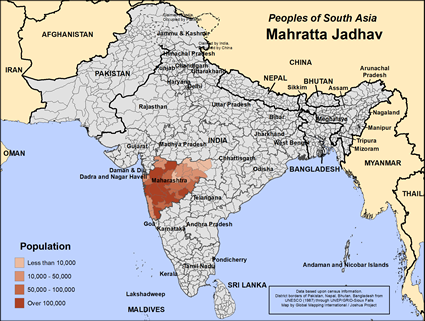The name Mahratha comes from the word invincible. From that comes the Mahratta peoples, who once ruled a mighty empire that challenged the British Empire in the 18th century.
They have a proud military history and have had good status for many centuries. Marathi is their language. They usually read and write in Devanagari. The Mahrattas have several subgroups, one of which is the Jadhav. This large group lives throughout Maharashtra.
They work mainly in agriculture and in the sale of crops. Some work in business, government service or as day laborers. They have a council of elders to look after their interests. They believe in education and modern medicines.
They usually marry their cousins. Widowers and the divorced can marry again. They cremate their dead. Sons inherit the property after the father dies.
The Jadhav Mahratta people practice Hinduism, the ancient religion of India. Hinduism is a catch-all phrase for the local religions of South Asia, so it is very diverse. At the popular level, Hindus worship and serve the gods of the Hindu pantheon. They visit Hindu temples and offer prayers, food, flowers, and incense to their gods in hopes of gaining protection and benefits. They do not have a personal or familial relationship with their gods like Christians or Jews. There are other Hindus who are much more philosophical, especially among the Brahmins.
Almost all Hindus participate in yearly celebrations like Holi, the festival of colors and the start of spring / Diwali, the festival of lights / Navratri, the celebration of autumn / and Rama Navami, Rama's birthday.
This Hindu people needs to put their faith in the King of kings and Lord of lords.
Pray that the council leaders will come to Jesus Christ and lead others to him.
Pray that gospel materials will lead entire Jadhav Mahratta families into life-giving faith in Jesus Christ.
Pray for a prayer movement for the Jadhav Mahratta, followed by Christian workers.
Scripture Prayers for the Mahratta Jadhav in India.
Singh, K. S., ed. "India's Communities A-Z", Oxford University Press, USA 1999
| Profile Source: Joshua Project |











